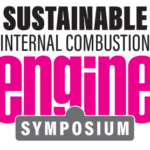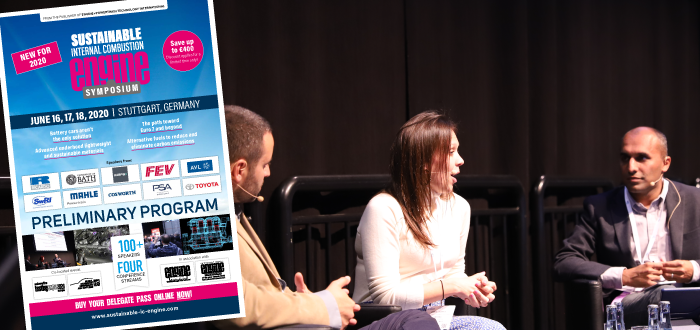The brand-new Sustainable Internal Combustion Engine Symposium, which will be held June 16, 17 and 18, 2020, at ICS, Messe Stuttgart, Germany, has just published its preliminary program, revealing the speakers and topics already secured for this summer’s hottest ticket. The symposium will discuss and debate the future of gasoline, diesel and alternative fuel IC engines, and highlight how the traditional automotive powertrain has a long future ahead of it when it is developed and advanced beyond its current role.
Expert speakers – each sourced by the publishers of Engine + Powertrain Technology International magazine – will present future concepts and technologies for the IC engine. You’ll also hear about IC possibilities from pioneering startups and market analysts, and legislators and emission-standard key decision makers. Here are just some of the must-see presentations announced in the preliminary program:

Dr Wissam Bou Nader, research and development engineer – advanced research and innovation projects, Groupe PSA, will give a presentation titled: Overall efficiency optimization of a combined-cycle machine for a range-extended electric vehicle: methodology and testing of ICE coupled to WHR system. Waste heat recovery (WHR) systems constitute a promising solution for reducing vehicle fuel consumption in order to meet the CO2 regulation targets by 2025. Overall efficiency optimization of a combined cycle machine consisting of a reciprocating internal combustion engine (ICE) and a bottoming WHR system for a range-extended electric vehicle (REEV) is studied. A methodology is proposed to improve the overall operational efficiency for such a combined-cycle machine, and the application’s different systems could be integrated in REEV.

What are the opportunities and technologies for IC engines in a net-zero CO2 and zero-emissions future? Prof Sam Akehurst of the IAAPS – Institute for Advanced Automotive Propulsion Systems and the UK’s University of Bath, will address this. Even the most optimistic projection for BEV and PHEV uptake has 57% market penetration by 2040, based on annual sales. Of that, ~15% will be PHEV fitted with an internal combustion engine, meaning that the majority of vehicles sold in 2040 will still feature an internal combustion engine. Therefore it is essential that we continue to consider all opportunities to minimize IC engine emissions and pathways to reducing the CO2 footprint of future vehicles. This presentation will give an overview of potential pathways to net-zero CO2 and near-zero emissions at the tailpipe, including novel engine topologies, advanced combustion concepts, future fuels and complete powertrain energy management. Synergies between electrification and IC engine optimization will be highlighted as potential pathways to significantly increase IC engine efficiency.

The debate between hydrogen ICE and fuel cells continues: Dr Carlo Locci, global application specialist: hydrogen fuel cells at Siemens PLM will use numerical modeling to explore the dilemma. Hydrogen is seen as one of the main energy vectors of the future. Such technology still faces several challenges in terms of both production/storage and usage. In the automotive sector, hydrogen can be used in internal combustion engines and fuel cells. The two systems are extremely different in terms of efficiency and performance. In this presentation, the two technologies are discussed and analyzed from the numerical modeling perspective.

Electrification offers strong advantages for many but falls a long way short of fulfilling all of society’s mobility requirements, says Paul Freeland, principal engineer, Cosworth Limited. Electrification offers some strong advantages for many transport applications in reducing CO2 and localized polluting emissions, but falls a long way short of fulfilling all of society’s requirements for social and business mobility. This presentation takes an independent, pragmatic approach to what is really required to achieve the targets laid out in the 2015 Paris Agreement, and looks at what can be achieved with technology as we know it to reduce greenhouse gas concentrations in the Earth’s atmosphere and improve local air quality issues.

A presentation by Dr Graham Conway, principal engineer at the Southwest Research Institute, will discuss some of the challenges of battery electric vehicles today and why they should not be called zero emissions. The talk also discusses how scaling batteries for larger applications such as trucks, ships and planes has many challenges. There will also be discussion of the flaws in industry measurements of CO2, and why lifecycle analysis is critical. Finally, the presentation will examine the role that electrification can have in unlocking further potential in the ICE. The summary is that the ICE will be around for a long time – it will adapt, evolve and survive.

Dr Peter Kelly Senecal, owner and vice president of Convergent Science, argues that a mix of propulsion technologies is the way forward for the future fleet. Transportation today is almost exclusively powered by the internal combustion engine (ICE). Although engines have become considerably cleaner and more efficient over the past few decades, human health and environmental concerns have led several governments around the world to propose bans on diesel and gasoline cars. The electrification of transportation, while often touted as the only way to mitigate vehicle emissions, comes with its own set of concerns and challenges that must be considered when developing future transportation technologies. Furthermore, there is still significant untapped potential in ICE concepts and the fuels they use. This presentation argues that hybrid systems are the fastest way to reduce CO2 emissions from vehicles and that, when judged on a lifecycle basis, the vehicle technology with the least environmental and health impact is highly region dependent. Therefore, a mixture of transportation technologies is necessary in the future fleet.
 The Sustainable Internal Combustion Engine Symposium (rates apply) takes place June 16-18, in Stuttgart. Book your pass for the Sustainable Internal Combustion Engine Symposium, the international conference dedicated to the future of internal combustion engines, here.
The Sustainable Internal Combustion Engine Symposium (rates apply) takes place June 16-18, in Stuttgart. Book your pass for the Sustainable Internal Combustion Engine Symposium, the international conference dedicated to the future of internal combustion engines, here.


